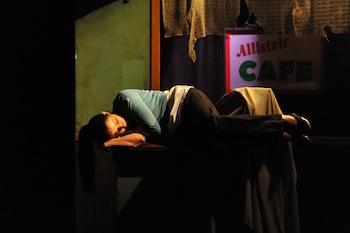In Café Daughter, a play at Toronto’s Aki Theatre, a Chinese Cree girl grows up in Saskatchewan
Growing up, most of what I knew of the prairies was culled from Laura Ingalls Wilder novels and snippets of Joni Mitchell’s songs. Café Daughter is a story of a young girl coming of age in Saskatchewan in the 1950s but it definitely isn’t Little House on the Prairie.
In the programme notes writer Kenneth T. Williams, a Cree playwright from the George Gordon First Nation in Saskatchewan, thanks “racist pieces of legislation” for helping him write the play. Williams was also inspired by the life of Canadian Senator, Dr. Lillian Eva Quan Dyck, a world-renowned doctor of neuroscience who is of mixed Chinese and Cree ancestry and who also happened to be in attendance at the Wednesday night premiere.
The circumstances surrounding the senator’s life were very much influenced by “racist pieces of legislation.” The Chinese Exclusion Act of 1923 barred all Chinese immigration to Canada and the Female Employment Act, passed in Saskatchewan in 1912 to protect the morality of white women, made it illegal for Chinese men to hire white women to work in their businesses. As a result, many First Nations women ended up working in Chinese-owned cafes sometimes resulting in marriages and children.
The 1950s was also the era of the Indian residential schools system when government-funded and church-administered schools were set up to assimilate Aboriginal children into European-Canadian society and “kill the Indian in the child”. The residential school system left a terrible legacy of physical, emotional, and sexual abuse and its effects are felt to this day.
Café Daughter is the story of Yvette Wong, a young Chinese Canadian Cree girl growing up in a small Saskatchewan town. Her Chinese father owns the town café. Her mother, an off-reserve Cree, exhibits the residual shame and self-loathing from a residential school education. She makes Yvette promise never to divulge her Cree heritage for fear that she will be discriminated against if people discover she’s an “Indian.”
The play follows Yvette through high school as she faces discrimination and outright racism and struggles to accept her own Cree identity while pursuing her dream of becoming a doctor.
PJ Prudat delivers a measured, engaging, and tireless solo performance in which she deftly weaves in and out of twelve different characters throughout the 90-minute play. Prudat uses shifts in vocal intonations and body language to create different characters and effectively uses accents without straying into caricature. She has a remarkable ability to imbue her characters with an affecting humanity.
So much of our country’s history isn’t taught in schools and there are stories that we rarely get to hear. It’s always refreshing to see a non Euro-centric Canadian story, it opens people up to the idea that there is more than one Canadian narrative, that the rich mosaic of our country today has roots that extend back generations and those stories have only recently started coming to light.
Café Daughter is a uniquely Canadian story told in an engaging and heartfelt performance by a talented young actor. I encourage you to see it for yourself.
Details:
- Café Daughter is playing through January 20, 2013 at the Aki Studio Theatre in the Daniels Spectrum building, 585 Dundas Street E (at Parliament), Toronto.
- Shows run Tuesday to Saturday at 8:00 p.m., Saturday and Sunday at 2:30 p.m.
- Tickets $10 – $20.
- Tickets are available by phone at 1-800-204-0855, for more information visit nativeearth.ca
Photo of PJ Prudat by Bruce Barrett

